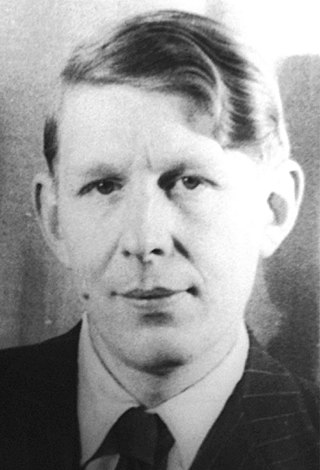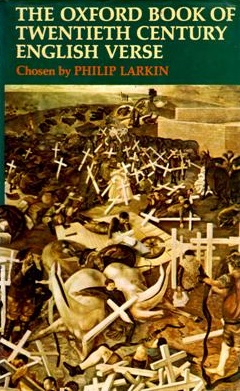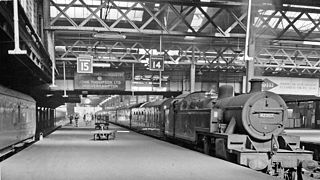
Wystan Hugh Auden was a British-American poet. Auden's poetry is noted for its stylistic and technical achievement, its engagement with politics, morals, love, and religion, and its variety in tone, form, and content. Some of his best known poems are about love, such as "Funeral Blues"; on political and social themes, such as "September 1, 1939" and "The Shield of Achilles"; on cultural and psychological themes, such as The Age of Anxiety; and on religious themes, such as "For the Time Being" and "Horae Canonicae".

Faber and Faber Limited, commonly known as Faber & Faber or simply Faber, is an independent publishing house in London. Published authors and poets include T. S. Eliot, W. H. Auden, Margaret Storey, William Golding, Samuel Beckett, Philip Larkin, Ted Hughes, Seamus Heaney, Paul Muldoon, Milan Kundera and Kazuo Ishiguro.

The Oxford Book of Twentieth Century English Verse is a poetry anthology edited by Philip Larkin. It was published in 1973 by Oxford University Press with ISBN 0-19-812137-7. Larkin writes in the short preface that the selection is wide rather than deep; and also notes that for the post-1914 period it is more a collection of poems, than of poets. The remit was limited by him to poets with a period of residence in the British Isles. Larkin's generous selection of Thomas Hardy's poems has been noted for its influence on Hardy's later reputation. On the other hand, he was criticized, notably by Donald Davie, for his inclusion of "pop" poets such as Brian Patten. The volume contains works by 207 poets.
The Faber Book of Modern Verse was a poetry anthology, edited in its first edition by Michael Roberts, and published in 1936 by Faber and Faber. There was a second edition (1951) edited by Anne Ridler, and a third edition (1965) edited by Donald Hall. The selection was of poems in English printed after 1910, which meant that work by Gerard Manley Hopkins could be included. A later edition was edited by Peter Porter.

Frederick Louis MacNeice was an Irish poet, playwright and producer for the BBC. His poetry, which frequently explores themes of introspection, empiricism, and belonging, is considered to be among the greatest of twentieth century literature. Despite being renowned as a member of the Auden Group, he was also an independently successful poet with an influential body of work, which is replete with themes ranging from faith to mortality. His body of work was appreciated by the public during his lifetime, due in part to his relaxed but socially and emotionally aware style. Never as overtly or simplistically political as some of his contemporaries, he expressed a humane opposition to totalitarianism as well as an acute awareness of his roots.
The Penguin poetry anthologies, published by Penguin Books, have at times played the role of a "third force" in British poetry, less literary than those from Faber and Faber, and less academic than those from Oxford University Press..
Charles Bernard Spencer was an English poet, translator, and editor.
Peter McDonald is a poet, university lecturer, and writer of literary criticism. He holds the post of Christopher Tower Student and Tutor in Poetry in the English Language at Christ Church, a college of the University of Oxford.
Jon Howie Stallworthy, was a British literary critic and poet. He was Professor of English at the University of Oxford from 1992 to 2000, and Professor Emeritus in retirement. He was also a Fellow of Wolfson College, Oxford, from 1986, where he was twice acting president. From 1977 to 1986, he was the John Wendell Anderson Professor of English at Cornell University.
The Auden Group, or Auden Generation, was a group of British and Irish writers active in the 1930s that included W. H. Auden, Louis MacNeice, Cecil Day-Lewis, Stephen Spender, Christopher Isherwood and sometimes Edward Upward and Rex Warner. They were sometimes called simply the Thirties poets.

Letters from Iceland is a travel book in prose and verse by W. H. Auden and Louis MacNeice, published in 1937.

Sir Stephen Harold Spender was an English poet, novelist and essayist whose work concentrated on themes of social injustice and the class struggle. He was appointed U.S. Poet Laureate Consultant in Poetry to the Library of Congress in 1965.
Oxford Poetry is a literary magazine based in Oxford, England. It is currently edited by Luke Allan. The magazine is published by Partus Press.
This is a bibliography of books, plays, films, and libretti written, edited, or translated by the Anglo-American poet W. H. Auden (1907–1973). See the main entry for a list of biographical and critical studies and external links. Dates are dates of publication of performance, not of composition.

The Earth Compels was the second poetry collection by Louis MacNeice. It was published by Faber and Faber on 28 April 1938, and was one of four books by Louis MacNeice to appear in 1938, along with I Crossed the Minch, Modern Poetry: A Personal Essay and Zoo.

Zoo is a book by Louis MacNeice. It was published by Michael Joseph in November 1938, and according to the publisher's list belongs in the category of belles lettres. It was one of four books by Louis MacNeice to appear in 1938, along with The Earth Compels, I Crossed the Minch and Modern Poetry: A Personal Essay.

"Carrickfergus" is a 44-line poem by Louis MacNeice. It was written in 1937 and first published in book form in MacNeice's poetry collection The Earth Compels (1938). The poem reflects on MacNeice's childhood in Carrickfergus, a large town in County Antrim, Northern Ireland. Although the title of the poem is "Carrickfergus", the text of the poem refers to "Carrick", as the town is known locally and colloquially.

Rugby Football Excursion is a 44-line poem by Louis MacNeice. It was written in 1938 and first published in book form in MacNeice's poetry collection The Earth Compels (1938). The poem recounts an excursion taken by MacNeice from London to Dublin, in order to watch a rugby football match at Lansdowne Road stadium. MacNeice does not specify the occasion, but internal evidence from the poem establishes the match as a rugby football international when England defeated Ireland on 12 February 1938, 36 - 14.

The Sunlight on the Garden is a 24-line poem by Louis MacNeice. It was written in late 1936 and was entitled Song at its first appearance in print, in The Listener magazine, January 1937. It was first published in book form as the third poem in MacNeice's poetry collection The Earth Compels (1938). The poem explores themes of time and loss, along with anxiety about the darkening political situation in Europe following the outbreak of the Spanish Civil War. It is one of the best known and most anthologized of MacNeice's short poems. George MacBeth describes it as "one of MacNeice's saddest and most beautiful lyrics".
June Thunder is a 28-line poem by Louis MacNeice. It was first published in book form in MacNeice's poetry collection The Earth Compels (1938). The poem begins with memories of idyllic summer days in the countryside - "the unenduring / Joys of a season" - before returning to the present and "impending thunder". June Thunder is written in a loose form of the sapphic stanza, with three lines set in falling rhythm followed by a shorter fourth line. The poem was anthologised in A New Anthology of Modern Verse 1920-1940 (1941), edited by Cecil Day-Lewis and L.A.G. Strong, and Penguin New Writing No. 2.












